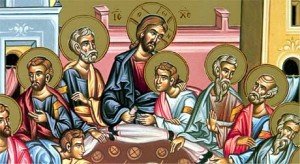As I indicated in the last issue of this article, Anamnesis is a central notion in our Liturgy. Liturgical remembrance of God’s action on behalf of and in relationship with humankind in history is both a starting point for worship and flows from worship. Therefore, worship is intrinsically linked with anamnesis (ἀνάμνησις). This Greek noun, in its New Testament context, is commonly translated in English as remembrance or commemoration. One author contends that Christian worship is fundamentally an anamnesis.
It must be pointed out, however, that it is an active remembrance of the paschal mystery – of our salvation through Christ’s death and His holy resurrection. Christian worship is fundamentally anamnetic, that is it is an act in which the present is brought into intimate contact with the past and vice-versa. This particular description of anamnesis is more akin to actualizing remembrance than merely active remembrance.
To understand this concept of actualizing remembrance, we need to know something about the actual development of the Christian notion. This notion is meant to move worshipers beyond liturgy, so that liturgy has an effect on society in which it is set.
The semantic range of the term anamnesis in Greek is wide and has undergone historical evolution in meaning. For instance, in the Attic Greek of Plato, ἀνάμνησις was used as an equivalent to recollection. In Plato’s Meno, Socrates argues that one either has in mind a prior concept of a subject or one has no prior notion of the subject. No learning takes place without prior anamnesis of a subject.
Plotinus, a contemporary of early-Christians, developed Plato’s doctrine of anamnesis further. Plotinus held that anamnesis must derive from intelligible matter, from something experienced.
None of these historical examples of the evolution of the meaning of anamnesis correspond fully with the Christian usage of this term or its significance for Christian worship, although the French postmodern literary notion of anamnesis correlates most closely with the Christian sense of remembrance that brings past action into the present.
All this will become clear as we continue to think about this idea the Liturgy as Anamnesis.

